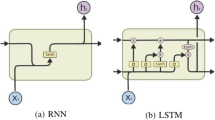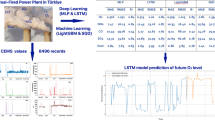Abstract
Accurate assessment of greenhouse gas emissions from wastewater treatment plants is crucial for mitigating climate change. N2O is a potent greenhouse gas that is emitted from wastewater treatment plants during the biological denitrification process. In this study, we developed and evaluated deep learning models for predicting N2O emissions from a WWTP in Switzerland. Six key parameters were selected to obtain the optimal LSTM model by adjusting experimental parameter conditions. The optimal parameter condition was achieved with 150 neurons, the tanh activation function, the RMSprop optimization algorithm, a learning rate of 0.001, no dropout regularization, and a batch size of 128. Under the same conditions, we compared the performance of recurrent neural networks (RNNs) and Long Short-Term Memory (LSTM) networks. We found that LSTM models outperformed RNN models in predicting N2O emissions. The optimal LSTM model achieved a 36% improvement in mean absolute error (MAE), a 19% improvement in root mean squared error (RMSE), and a 6.92% improvement in R2 score compared to the RNN model. Additionally, LSTM models demonstrated better resilience to sudden changes in the target sequence, exhibiting a 9.54% higher percentage of explained variance compared to RNNs. These results highlight the potential of LSTM models for accurate and robust prediction of N2O emissions from wastewater treatment plants, contributing to effective greenhouse gas mitigation strategies.

















Similar content being viewed by others
Data availability
Data is avaliable upon request.
References
Abdel-Nasser M, Mahmoud K (2017) Accurate photovoltaic power forecasting models using deep LSTM-RNN. Neural Comput Appl 2727–2740. https://doi.org/10.1007/s00521-017-3225-z
Adibimanesh B, Polesek-Karczewska S, Bagherzadeh F et al (2023) Energy consumption optimization in wastewater treatment plants: Machine learning for monitoring incineration of sewage sludge. Sustain Energy Technol Assess. https://doi.org/10.1016/j.seta.2023.103040
Bae W B, Park Y, Chandran K et al (2021) Temporal triggers of N2O emissions during cyclical and seasonal variations of a full-scale sequencing batch reactor treating municipal wastewater. Sci Total Environ 149093. https://doi.org/10.1016/j.scitotenv.2021.149093
Bagherzadeh F, Shafighfard T (2022) Ensemble Machine Learning approach for evaluating the material characterization of carbon nanotube-reinforced cementitious composites. Case Stud Constr Mate. https://doi.org/10.1016/j.cscm.2022.e01537
Bagherzadeh F, Shafighfard T, Khan RMA et al (2023) Prediction of maximum tensile stress in plain-weave composite laminates with interacting holes via stacked machine learning algorithms: A comparative study. Mech Syst Signal Process. https://doi.org/10.1016/j.ymssp.2023.110315
Bengio Y (2012) Practical Recommendations for Gradient-Based Training of Deep Architectures. Journal 437–478. https://doi.org/10.1007/978-3-642-35289-8_26
Benson B, Pan WD, Prasad A et al (2020) Forecasting Solar Cycle 25 Using Deep Neural Networks. Sol Phys. https://doi.org/10.1007/s11207-020-01634-y
Brownlee J (2017) Long Short-Term Memory Networks With Python: Develop Sequence Prediction Models with Deep Learning. Machine Learning Mastery, Ebook. https://machinelearningmastery.com/lstms-with-python/
Carpenter CMG, Wong LYJ, Gutema DL et al (2019) Fall Creek Monitoring Station: Using Environmental Covariates To Predict Micropollutant Dynamics and Peak Events in Surface Water Systems. Environ Sci Technol 8599–8610. https://doi.org/10.1021/acs.est.9b02665
Cheng T, Harrou F, Kadri F et al (2020) Forecasting of Wastewater Treatment Plant Key Features Using Deep Learning-Based Models: A Case Study. IEEE Access 184475–184485. https://doi.org/10.1109/access.2020.3030820
Corominas L, Garrido-Baserba M, Villez K et al (2018) Transforming data into knowledge for improved wastewater treatment operation: A critical review of techniques. Environ Model Softw 89–103. https://doi.org/10.1016/j.envsoft.2017.11.023
Delre A, ten Hoeve M, Scheutz C (2019) Site-specific carbon footprints of Scandinavian wastewater treatment plants, using the life cycle assessment approach. J Clean Prod 1001–1014. https://doi.org/10.1016/j.jclepro.2018.11.200
Farhi N, Kohen E, Mamane H et al (2021) Prediction of wastewater treatment quality using LSTM neural network. Environ Technol Innov. https://doi.org/10.1016/j.eti.2021.101632
Gruber W, Villez K, Kipf M et al (2020) N2O emission in full-scale wastewater treatment: Proposing a refined monitoring strategy. Sci Total Environ 134157. https://doi.org/10.1016/j.scitotenv.2019.134157
Guo Q, He Z (2021) Prediction of the confirmed cases and deaths of global COVID-19 using artificial intelligence. Environ Sci Pollut R 11672–11682. https://doi.org/10.1007/s11356-020-11930-6
Guo Q, He Z, Li S et al (2020) Air Pollution Forecasting Using Artificial and Wavelet Neural Networks with Meteorological Conditions. Aerosol Air Qual Res 1429–1439. https://doi.org/10.4209/aaqr.2020.03.0097
Guo Q, He Z, Wang Z (2022) Long-term projection of future climate change over the twenty-first century in the Sahara region in Africa under four Shared Socio-Economic Pathways scenarios. Environ Sci Pollut R 22319–22329. https://doi.org/10.1007/s11356-022-23813-z
Guo Q, He Z, Wang Z (2023a) Predicting of Daily PM2.5 Concentration Employing Wavelet Artificial Neural Networks Based on Meteorological Elements in Shanghai, China. Journal. https://doi.org/10.3390/toxics11010051
Guo Q, He Z, Wang Z (2023b) Prediction of Hourly PM2.5 and PM10 Concentrations in Chongqing City in China Based on Artificial Neural Network. Aerosol Air Qual Res 220448. https://doi.org/10.4209/aaqr.220448
Guo Q, He Z, Wang Z (2023c) Simulating daily PM2.5 concentrations using wavelet analysis and artificial neural network with remote sensing and surface observation data. Chemosphere 139886. https://doi.org/10.1016/j.chemosphere.2023.139886
Hauduc H, Neumann MB, Muschalla D et al (2015) Efficiency criteria for environmental model quality assessment: A review and its application to wastewater treatment. Environ Model Softw 196–204. https://doi.org/10.1016/j.envsoft.2015.02.004
He Z, Guo Q, Wang Z et al (2022) Prediction of Monthly PM2.5 Concentration in Liaocheng in Chin Employing Artificial Neural Network. Journal. https://doi.org/10.3390/atmos13081221
Hinton GE, Srivastava N, Krizhevsky A et al (2012) Improving neural networks by preventing co-adaptation of feature detectors. arXiv:1207.0580. https://doi.org/10.48550/arXiv.1207.0580
Hochreiter S, Schmidhuber J (1997) Long Short-Term Memory. Neural Comput 9(8):1735–1780. https://doi.org/10.1162/neco.1997.9.8.1735
Hwangbo S, Nam K, Heo S et al (2019) Hydrogen-based self-sustaining integrated renewable electricity network (HySIREN) using a supply-demand forecasting model and deep-learning algorithms. Energy Convers Manag 353–367. https://doi.org/10.1016/j.enconman.2019.02.017
Hwangbo S, Al R, Chen X et al (2021) Integrated Model for Understanding N2O Emissions from Wastewater Treatment Plants: A Deep Learning Approach. Environ Sci Technol 2143–2151. https://doi.org/10.1021/acs.est.0c05231
Koutsou OP, Gatidou G, Stasinakis AS (2018) Domestic wastewater management in Greece: Greenhouse gas emissions estimation at country scale. J Clean Prod 851–859. https://doi.org/10.1016/j.jclepro.2018.04.039
Li K, Duan H, Liu L et al (2022) An Integrated First Principal and Deep Learning Approach for Modeling Nitrous Oxide Emissions from Wastewater Treatment Plants. Environ Sci Technol 2816–2826. https://doi.org/10.1021/acs.est.1c05020
Limouni T, Yaagoubi R, Bouziane K et al (2023) Accurate one step and multistep forecasting of very short-term PV power using LSTM-TCN model. Renew Energy 1010–1024. https://doi.org/10.1016/j.renene.2023.01.118
Maktabifard M, Zaborowska E, Makinia J (2020) Energy neutrality versus carbon footprint minimization in municipal wastewater treatment plants. Bioresour Technol 122647. https://doi.org/10.1016/j.biortech.2019.122647
Mannina G, Rebouças TF, Cosenza A et al (2019) A plant-wide wastewater treatment plant model for carbon and energy footprint: Model application and scenario analysis. J Clean Prod 244–256. https://doi.org/10.1016/j.jclepro.2019.01.255
Mehrani MJ, Bagherzadeh F, Zheng M et al (2022) Application of a hybrid mechanistic/machine learning model for prediction of nitrous oxide (N2O) production in a nitrifying sequencing batch reactor. Process Saf Environ Prot 162:1015–24. https://doi.org/10.1016/j.psep.2022.04.058
Movsessian A, García Cava D, Tcherniak D (2021) An artificial neural network methodology for damage detection: Demonstration on an operating wind turbine blade. Mech Syst Signal Process. https://doi.org/10.1016/j.ymssp.2021.107766
Nam K, Hwangbo S, Yoo C (2020) A deep learning-based forecasting model for renewable energy scenarios to guide sustainable energy policy: A case study of Korea. Renew Sustain Energy Rev. https://doi.org/10.1016/j.rser.2020.109725
Newhart KB, Holloway RW, Hering AS et al (2019) Data-driven performance analyses of wastewater treatment plants: A review. Water Res 157:498–513. https://doi.org/10.1016/j.watres.2019.03.030
Ren JX, Gao QX, Chen HT et al (2021) Simulation research on greenhouse gas emissions from wastewater treatment plants under the vision of carbon neutrality[J]. Clim Chang Res 17(4):410–419
Stone R (2013) Intergovernmental Panel on Climate Change Fifth Assessment Report. IPCC: Geneva, Switzerland. https://www.ipcc.ch/assessment-report/ar5/
Vasilaki V, Massara TM, Stanchev P et al (2019) A decade of nitrous oxide (N2O) monitoring in full-scale wastewater treatment processes: A critical review. Water Res 392–412. https://doi.org/10.1016/j.watres.2019.04.022
Wang Z, Man Y, Hu Y et al (2019) A deep learning based dynamic COD prediction model for urban sewage. Environmental Science: Water Res Technol 2210–2218. https://doi.org/10.1039/c9ew00505f
Xu RZ, Cao JS, Fang F (2022) Research progress on N2O recycling and data-driven modeling in wastewater preatment processes. Environ Eng 107–115. https://doi.org/10.13205/j.hjgc.202206014
Yu Y, Si X, Hu C et al (2019) A Review of Recurrent Neural Networks: LSTM Cells and Network Architectures. Neural Comput 1235–1270. https://doi.org/10.1162/neco_a_01199
Zaremba W, Sutskever I , Vinyals O (2014) Recurrent Neural Network Regularization. arXiv:1409.2329. https://doi.org/10.48550/arXiv.1409.2329
Zhang Q, Yang LT, Chen Z et al (2018) A survey on deep learning for big data. Inform Fusion 146–157. https://doi.org/10.1016/j.inffus.2017.10.006
Zhang GP (2003) Time series forecasting using a hybrid ARIMA and neural network model. Neurocomputing 159–175. https://doi.org/10.1016/S0925-2312(01)00702-0
Zhao H, Xu X, Tang J et al (2023) Understanding the key factors and future trends of ecosystem service value to support the decision management in the cluster cities around the Yellow River floodplain area. Ecol Ind. https://doi.org/10.1016/j.ecolind.2023.110544
Zhong S, Zhang K, Bagheri M et al (2021) Machine Learning: New Ideas and Tools in Environmental Science and Engineering. Environ Sci Technol 12741–12754. https://doi.org/10.1021/acs.est.1c01339
Zhou H, Zhang Y, Yang L et al (2019) Short-Term Photovoltaic Power Forecasting Based on Long Short Term Memory Neural Network and Attention Mechanism. IEEE Access 78063–78074. https://doi.org/10.1109/access.2019.2923006
Funding
The authors declare that no funds, grants, or other support were received during the preparation of this manuscript.
Author information
Authors and Affiliations
Contributions
Xiaozhen Xu: Investigation, Data curation, Programming, Writing-original draft. Anlei Wei: Conceptualization, Methodology, Supervision, Writing-review and editing. Songjun Tang: Investigation. Qi Liu: Investigation, Conceptualization. Hanxiao Shi: Investigation, Visualization. Wei Sun: Writing-review & editing. All authors read and approved the final manuscript.
Corresponding author
Ethics declarations
Ethical approval
Not applicable.
Consent to participate
Not applicable.
Consent to publish
Not applicable.
Competing interests
The authors declare no competing interests.
Additional information
Responsible Editor: Marcus Schulz
Publisher's Note
Springer Nature remains neutral with regard to jurisdictional claims in published maps and institutional affiliations.
Rights and permissions
Springer Nature or its licensor (e.g. a society or other partner) holds exclusive rights to this article under a publishing agreement with the author(s) or other rightsholder(s); author self-archiving of the accepted manuscript version of this article is solely governed by the terms of such publishing agreement and applicable law.
About this article
Cite this article
Xu, X., Wei, A., Tang, S. et al. Prediction of nitrous oxide emission of a municipal wastewater treatment plant using LSTM-based deep learning models. Environ Sci Pollut Res 31, 2167–2186 (2024). https://doi.org/10.1007/s11356-023-31250-9
Received:
Accepted:
Published:
Issue Date:
DOI: https://doi.org/10.1007/s11356-023-31250-9




